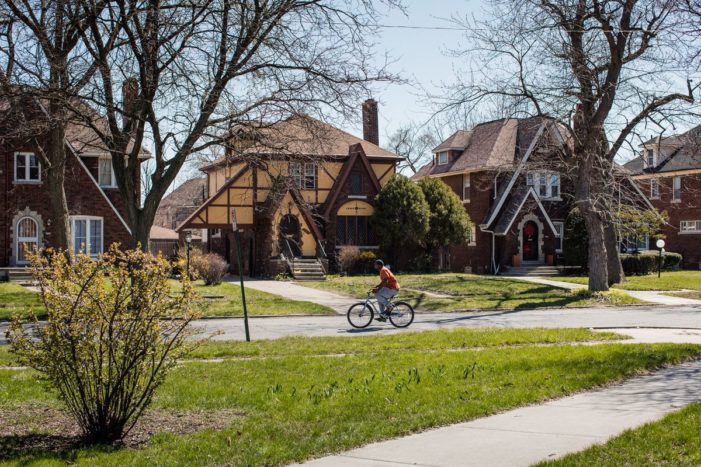In his role as a Comerica Bank’s community reinvestment manager, Michael (Mike) Cheatham knows a lot about supporting neighborhoods, but in his role as a son, he worries about his dad’s comfort.
Cheatham, vice president of corporate compliance and community reinvestment, helps to guide Comerica’s efforts to support Michigan’s low-to-moderate income communities.
“There’s help out there for people who are suffering . . .We see neighborhoods right around the corner from supporting organizations.” -Michael K. Cheatham, Vice President of Corporate Compliance and Community Reinvestment, Comerica Bank
As banks such as Comerica continue to deploy resources in Michigan, Detroit’s revitalization makes it an increasingly attractive market. Even so, Cheatham can’t help but think of people whose addresses are just now starting to get on the radar for major financing.

The Russell Woods house where Cheatham was raised remains the only place his dad wants to live, but could be costly to renovate with the features and conveniences Cheatham and his siblings want their father to experience.
“Given that it’s going to take $40,000 to $50,000 to upgrade my dad’s house, it’s unlikely that the necessary updates will be made in the near future,” said Cheatham. “Until property values improve, it’s difficult to justify or finance that level of investment in your house.”
As part of Comerica’s goal to reduce the home appraisal gap in older neighborhoods where renovation and purchase costs exceed value, the bank has announced a $5 million investment in the Detroit Home Mortgage program, an initiative introduced last year to help solve Detroit’s appraisal gap problem. Managed by Community Reinvestment Fund, USA, Detroit Home Mortgage was formed to create more access for Detroit home buyers.
“The conversations about how the neighborhoods are in need are resonating with those who can help,” Cheatham said.
While philanthropic organizations such as Life Remodeled are giving attention to communities, more work is needed by corporations and non-profits alike, according to Cheatham. Younger, first-time homebuyers have begun recognizing the value and appeal of living in neighborhoods outside of downtown, where property values are going up, he added.
“Although property values may be increasing, you might still see a great house next to a vacant one,” said Cheatham. “I’ve witnessed squatters occupying several homes on my block. People who are coming from outside of the area may not be comfortable living in a neighborhood like that.”
Cheatham acknowledges the need for assistance to the homeless and overall revitalization.
“There’s help out there for people who are suffering, but I’m not sure if they’re aware of the available help,” Cheatham said. “We see neighborhoods right around the corner from supporting organizations.”
Developed through a collaboration of government, local banks, foundations and nonprofits, Detroit Home Mortgage is designed to make it easier for prospective buyers to finance a local home. Less than 20 percent of home purchases in the city were financed with mortgages last year, according to reports. A list of lenders participating in the program is available at detroithomemortgage.org.
Beyond dollar investments, Comerica is promoting Detroit Home Mortgage to its corporate peers along with its provision of financial education initiatives. An ongoing collaboration with partners, such as Beaumont Hospital underscores its commitment to restoring neighborhoods, Cheatham added.
Many new Detroiters have come to view houses as appealing for their square footage and utility features, yet others appreciate a sense of community. Cheatham recalls growing up in a subdivision where he knew all of his neighbors and walked to school daily without concerns for his safety.
“Those are the types of things Detroit needs to be the Detroit we grew up in, remember and revere.”
Editor’s Note: In May the City and Planning and Development Department announced its intent to support improvements in the Russell Woods and Nardin Park area with specific focus on vacant homes, schools and multi-family buildings.
About Detroit Home Mortgage
Detroit Home Mortgage was introduced in 2016 to help solve Detroit’s appraisal gap problem. With Detroit housing appraising at a lower value than the acquisition and renovation price, prospective home buyers having difficulty financing their purchase of Detroit homes can now obtain a second mortgage to help fill the gap.
Comerica’s commitment to invest in Detroit Home Mortgage builds on the bank’s $3 million investment in its banking center network in and around downtown Detroit. Earlier this year the bank announced plans to open new locations, relocate offices and sell offices to make way for new developments downtown.
Lead photo: Russell Woods residents would love to see their neighborhood restored to its former glory. Photo Michelle and Chris Gerard


